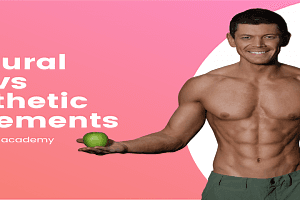Supplements: Natural OR Synthetic

Dr. Chirag Sethi* and Dr. Swarna Anchal**
*Director, Classic Fitness Academy, New Delhi
**Technical Writer, Classic Fitness Academy, New Delhi.
‘To get 500 mg of vitamin C and 10 mg of various vitamins B from natural sources would require a tablet equal to the size of football’
-Donald P Goldberg
Origin
The Health benefits of taking vitamins and mineral supplements are not hidden. But there is so much choice and variation in their price that it becomes confusing to choose a supplement, their source of origin, and safety.By the time our soil profile has degenerated in terms of nutrients due to heavily using herbicides and pesticides. It means we are not getting the same amount of nutrients that our ancestors did, even at present time, it is not possible to meet our daily requirements with diet alone. So when we supplement the diet with natural supplements, the probability of getting the actual nutrition increases. Multivitamin and mineral supplements provide a wide range spectrum of nutrients in one or two daily capsules. The present article is related to natural and synthetic supplements, their manufacturing and bioavailability, pros and cons, who can take them, and what are points one must remember when buying a supplement.
Vitamin will be called natural if it is made from a component directly from the earth, plant-based, or 'naturally made in our body through digestion’. So natural vitamin is something that comes directly from your food such as fruits, vegetables, and animal products hence beneficial components remain in their natural form. They can be dried, concentrated, and extracted to form a nutritional supplement.
However, pills don’t grow on trees. Synthetic nutrients are made in laboratories from industrial processes and they mimic the chemical structure of natural nutrients. However synthetic nutrients are isolated but due to the lack of co-factors, they do not properly absorb in the body.
The first things, manufacturers keep in mind to create supplements to be cost-effective as well as their similarity to natural counterparts. But the production of synthetic nutrients is chemical-based and very different from the process as plants and animals create them. So only having a similar structure does not mean your body will respond the same to synthetic compounds.
When we take a synthetic supplement, they enter the bloodstream via gut metabolism. It is not necessary that they will be recognized as beneficial and will be absorbed. Surprisingly, their large amount is excreted as waste. There are a plethora of studies that have shown natural nutrients have a higher bioavailability than synthetic compounds. So if anyone claiming to provide 100% Recommended Daily Allowance (RDA) for Vitamins and minerals can be a misleading statement as the body does not absorb the synthetic supplement more than half.
Characteristics and Absorption
Natural food supplements are derived from whole food sources and have high bioavailability hence fully absorbed by the body is taken as an advantage. However, the disadvantages of natural supplements include their higher cost to meet RDA, and a much larger quantity is needed to be consumed.
On the other hand, the advantage of synthetic supplements is that they are manufactured in mass quantities in the laboratory hence less costly and consumed as a small tablet, capsule, and powder form once or twice daily to meet RDA.
The major disadvantage of the synthetic supplement is their less absorption in the body. The reason behind this is, natural foods are having a wide range of vitamins, minerals, co-factors, and enzymes that work synergistically for optimum uptake of nutrients by the body which is absent in the case of synthetic supplements.
Besides all the things, satiety is an important factor that cannot be ignored. Synthetic supplements cannot give the feeling of stomach fullness or cannot satisfy the appetite. On the other hand, natural food consumption will keep you full, curb cravings, and prevent snacking while dieting along with providing nutrients.
Whey Protein
Whey proteins are made up after drying the milk and have the highest Biological Value (BV). BV is the "percentage or amount used by the body of either the total protein consumed or the digestible protein available." Let us understand it with an example as shown in the table which shows the BV of whey protein, eggs, and chicken breast, etc.
Does the BV mean whey is the best protein source, Of course, not? It just means you absorb more protein from whey as compare to any other sources. However, it will neither help you to keep full nor prevent cravings.
Iron Intake
Let us take another example (table) of iron intake via naturally or by supplementation. The iron RDA for male is 8.7 g/day and 14.8 mg/day for females. The given table is showing various natural food products and their iron amount in comparison with iron supplement tablet.
Let us consider if someone consuming 100 grams of raw spinach, he is probably getting the 2.7 mg of iron in a day. To meet his daily requirements he has to eat approximately 300 grams of spinach daily and the amount is much higher (500 grams/day) for females to meet daily requirements (14.5 mg) which is generally not possible and highly depend on person’s mood and eating habits.
But in case of synthetic supplements, they provide up to 60 mg of iron/tablet but a larger part is excreted from body and also the satiety factor cannot be ignored.
We can understand the concept by some other examples of vitamin C, Vitamin E, and omega 3 fats. The following table showing the RDA values of vitamin C, vitamin E, and omega 3 fats in comparison with natural as well as synthetic supplements.
Vulnerable groups

Safety Aspects
The safety of multivitamin and synthetic supplements always comes first. It is not related to whether a vitamin is synthetic or natural but the reputation of the manufacturer and whether he is using 'Good Manufacturing Processes' and a 'Third Party' for the testing of products. One has to be sure that vitamin supplements (whether they are synthetic or natural) are carefully tested for toxicity and contaminants and are properly labeled. One of the most important factors is that they must be broken down in the body in the appropriate amount of time. Some other factors that should be kept in mind while buying a synthetic supplement are that they must be 100% Natural (plant or animal-based) and certified ‘OrganicWhole Food’ material based.No artificial ingredients are included in their making process.
To check whether a supplement is natural or synthetic, always check the label. A synthetic supplement label will use the scientific name instead of food source e.g. ‘Retinyl Palmitate’ instead of Vitamin A; ‘Cyanocobalamin’ instead of Vitamin B12 and other chemical names in place of whole foods.
References:
(1) Gaziano J, Sesso H, Christen W, Bubes V, Smith J, MacFadyen J, Schvartz M, Manson J, Glynn R and Buring J (2012). Multivitamins in the Prevention of Cancer in Men. Journal of the American Medical Association 308(18):1871.
(2) Burton G, Traber M, Acuff R, Walters D, Kayden H, Hughes L and Ingold K (1998). Human plasma and tissue alpha-tocopherol concentrations in response to supplementation with deuterated natural and synthetic vitamin E. The American Journal of Clinical Nutrition 67(4):669-684.
(3) Yetley E (2007). Multivitamin and multimineral dietary supplements: definitions, characterization, bioavailability, and drug interactions. The American Journal of Clinical Nutrition 85(1):269-276.
(4) Liu R (2003). The Health benefits of fruit and vegetables are from additive and synergistic combinations of phytochemicals. The American Journal of Clinical Nutrition 78(3):517-520.
(5) Park M (2013). Half of Americans use supplements. Cable News Network.
(6) Lieberman S and Bruning N (1990). The Real Vitamin & Mineral Book.
(7) Susan S (2018). Nearly 800 dietary supplements contained unapproved drug ingredients. Cable News Network.
(8) Steven EP (2016). Warning letter: Vitalife Inc. Inspections, Compliance, Enforcement, and Criminal Investigations, US Food and Drug Administration. Retrieved 2019.
(9) Ronald MP (2017). Warning letter: Maine Natural Health, Inc. Inspections, Compliance, Enforcement, and Criminal Investigations. US Food and Drug Administration. Retrieved 2018.
(10) Miriam RB (2018). Warning letter: Independent Nutrition Inc. Inspections, Compliance, Enforcement, and Criminal Investigations. US Food and Drug Administration. Retrieved 2019.






